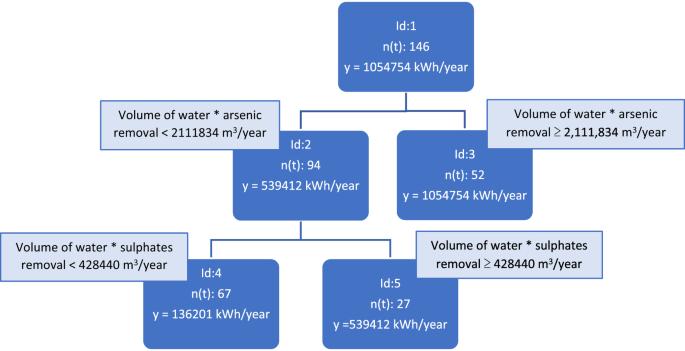Understanding energy performance in drinking water treatment plants using the efficiency analysis tree approach
IF 10.4
1区 工程技术
Q1 ENGINEERING, CHEMICAL
引用次数: 0
Abstract
Water treatment processes are known to consume substantial amounts of energy, making it crucial to understand their efficiency, drivers, and potential energy savings. In this study, we apply Efficiency Analysis Tree (EAT), which combines machine learning and linear programming techniques to assess the energy performance of 146 Chilean drinking water treatment plants (DWTPs) for 2020. Additionally, we utilize bootstrap regression techniques to examine the influence of operating characteristics on energy efficiency. The results indicate that the evaluated DWTPs exhibited poor energy performance, with an average energy efficiency score of 0.197. The estimated potential energy savings were found to be 0.005 kWh/m3. Several factors, such as the age of the facility, source of raw water, and treatment technology, were identified as significant drivers of energy efficiency in DWTPs. The insights gained from our study can be valuable for policymakers in making informed decisions regarding the adoption of practices that promote efficient and sustainable energy use within the water cycle.

使用效率分析树方法了解饮用水处理厂的能源绩效
众所周知,水处理过程消耗大量能源,因此了解其效率、驱动因素和潜在的节能效果至关重要。在本研究中,我们应用了效率分析树(EAT),它结合了机器学习和线性规划技术,对智利 146 家饮用水处理厂(DWTPs)2020 年的能源绩效进行了评估。此外,我们还利用引导回归技术来检验运行特征对能源效率的影响。结果表明,接受评估的 DWTPs 的能效表现较差,平均能效得分为 0.197。估计的潜在节能效果为 0.005 kWh/m3。有几个因素,如设施的年龄、原水来源和处理技术,被认为是影响污水处理厂能效的重要因素。从我们的研究中获得的启示对政策制定者做出明智决策非常有价值,有助于他们在水循环过程中采取促进高效和可持续能源利用的措施。
本文章由计算机程序翻译,如有差异,请以英文原文为准。
求助全文
约1分钟内获得全文
求助全文
来源期刊

npj Clean Water
Environmental Science-Water Science and Technology
CiteScore
15.30
自引率
2.60%
发文量
61
审稿时长
5 weeks
期刊介绍:
npj Clean Water publishes high-quality papers that report cutting-edge science, technology, applications, policies, and societal issues contributing to a more sustainable supply of clean water. The journal's publications may also support and accelerate the achievement of Sustainable Development Goal 6, which focuses on clean water and sanitation.
 求助内容:
求助内容: 应助结果提醒方式:
应助结果提醒方式:


